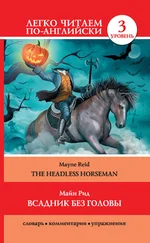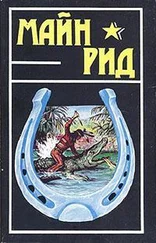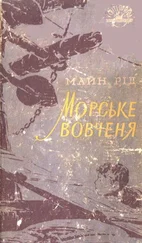Happily, these rather ungraceful exhibitions – like the tornadoes of her native land – were rare: for a certain name – the cause that called them forth – was but rarely pronounced in her hearing. Kate Vaughan was the name.
Judith’s dislike for the young Creole had originated in a mere rivalry of charms. Both enjoyed a wide-spread reputation for beauty – oft descanted upon, and often compared, by the idle gallants of the Bay. These discussions and comparisons reached the ears of the Jewess; and, to her chagrin, the decisions were not always in her favour. Hence the origin of her enmity.
Hitherto it had been only envy ; and, with a toss of the head, and a slight curl of the nostril, the unpleasant theme would be dismissed. Of late, however, a stronger emotion than envy had begun to exhibit itself; and, whenever the name of Kate Vaughan was introduced into the conversation – no matter how incidentally or undesigned – the eye of the Jewess would light up with a jealous fire, her lip quiver as if muttering curses, and she, who but the moment before seemed a very angel, would become all at once transformed into the semblance of a demon!
The behaviour of the Jewess admits of easy explanation. She was in love, and with Herbert Vaughan .
At first the motive had been part vanity, part coquetry – blended, however, with some serious admiration. Mingled also with this was a desire to vex Kate Vaughan: for, from the first, she had suspected rivalry in that quarter. Even though she had been made aware of the very short interview between the cousins, she could not feel satisfied but that something had passed between them; and there was that bit of ribbon, which Herbert still cherished, and of the symbolism of which she had vainly endeavoured to obtain a solution.
Her suspicions did not die out, as it might be supposed they would, in the absence of any demonstration on Herbert’s part towards his cousin. On the contrary, they only grew stronger as her own interest in the young Englishman increased, for then she could not understand how a young girl – Kate Vaughan, or any other – could have looked upon the man who had impressed her, without being herself impressed.
And she had become impressed by him, not gradually, but rapidly and profoundly; until her love had grown into a fierce passion – such as a tigress might be suspected of conceiving for her tawny mate.
Herbert Vaughan had passed scarce a week under the roof of the Jew’s mansion when its mistress was in love with him – to the ends of her fingers – to the very extreme of jealousy!
As for the object of this fervent passion, the young man was at this time altogether unable to analyse his own feelings.
It is true that the imperious spirit of the Jewess, aided by her endless wiles, had gained a certain ascendancy over him; but not so as to obliterate the image that had recently become impressed upon his heart.
In the short interview which he had had with his cousin Kate, Herbert Vaughan had looked, for the first time in his life, on one whom to look at was to love. The blue-eyed belle of his native village, the pretty barmaid at the inn, the sweet-faced chorister in the church – with other boyish fancies, already half obliterated by two months of absence – were swept instantaneously into the dustbin of oblivion by that lovely apparition. He was face to face with a woman worthy of his love – one who deserved every aspiration of his soul. Intuitively and at the first glance he had felt this; and still more was he impressed with it, as he pronounced those warm words on his painful parting. Hence the ardent proffer of the strong arm and the stout heart – hence the chivalric refusal of the purse, and the preference of a piece of ribbon.
Not that he had any reason to regard the latter as a love-token. He knew that the kind words that had been spoken in that short but stormy interview – as well as the offer of gold that had ended it – were but the promptings of a pitying heart; and rather a negation of love, than a sign of its existence. Glad as he might have been to have regarded the piece of ribbon as a guage d’amour , he could only prize it as a souvenir of friendship – of no higher signification than the purse to which it had belonged, or the gold treasure which that purse had contained.
Though sensible that he had no claim upon his cousin beyond that of kinship – though not a word had been spoken by her to show that she felt for him any other kind of regard, Herbert, strange enough, had conceived a hope, that some day or other, a more endearing relationship might exist between them.
Not for long was he cheered by this sweet expectancy. It was too transitory to stand the test of time. As day succeeded day, rumours reached him of the gay scenes that were transpiring at Mount Welcome. Especially was he informed of the contentedness of his cousin Kate in the society of the new companion which her father had provided for her.
The effect of this information was a gradual but grievous extinction of the slight hope which Herbert had conceived.
The circumstances with which chance had now surrounded him may have rendered these regrets less painful. Though his cousin cared not for him, he had no reason to feel forsaken or forlorn. By his side – and almost constantly by his side – was beauty of no common brilliance, showering smiles upon him of no ordinary attractiveness.
Had he been the recipient of those smiles only one day sooner – before the image of Kate Vaughan had made that slight impression upon his heart – he might the more readily have yielded to their influence. And, perhaps, on the other hand, could he have known how his image had fallen upon her heart, and made lodgment there, he might have offered a sterner resistance to the syren seductions with which he was now beset.
But lovers’ hearts are not things of glass; and though at times they resemble mirrors, mentally reflecting each other, too often, by the ruling of contrarieties, do the mirrors become reversed and with the reflecting images facing darkly inward.
In such a dilemma was the heart of Herbert Vaughan. No wonder he found a difficulty in effecting its analysis!
In a condition somewhat similar to Herbert’s was the heart of his cousin: though hers was easier to analyse. It was simply trembling under the influence of a first and virgin love. Two forms had been presented to it in the same hour, both in the blush of youthful manhood – one, a distinguished gentleman, the other, an humble adventurer.
The former had the additional advantage in priority of introduction; the latter was not even introduced. But the favourite does not always win. The earliest on the course may be the latest in the race; and though the heart of the young Creole, on its pure virgin page, had received love’s image at first sight, it was not that of him who first presented himself to make the impression.
Nor was she kept in ignorance of outward events. Her maid Yola was the medium by which she was acquainted with them. Through this medium she had heard of Herbert’s proximity – of his happiness and prosperity. The news would have given her joy, but that she had heard he was too happy . Strange that this should be a cause of bitterness!
The thoughts that succeeded – the hopes and fears – the dark doubts by day and by night – the dreams, often delusively bright – need not be detailed. There are none who have not known a first love; few who have not felt this chequered alternation of emotions.
As for the distinguished Smythje, he was not always in one mind. He, too, was troubled with an alternation of hopes and fears. The former, however, generally predominated; and, for the most part, he felt in his spirit the proud confidence of a conqueror. Often, with Thoms as his audience, might Smythje be heard exultingly repeating the despatch of Caesar: – “ Veni, vidi, vici ! [522] ”
Читать дальше
Конец ознакомительного отрывка
Купить книгу











